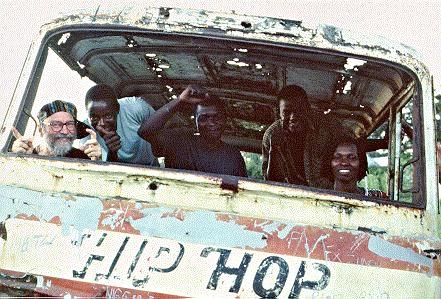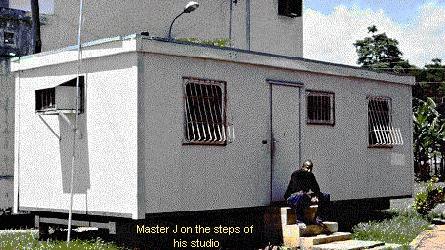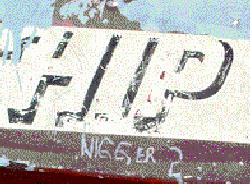

Tanzania is country which has tried to stick to its own line of development based on former president Nyerere's clever version of African socialism. This has not been very popular with the World Bank and other powerful agencies. Tanzania has suffered hard pressures and is now a very poor country. Before 1994 there was no TV in Dar and the radio was heavily promoting local music both traditional and popular. The trade unions and government business entreprises have been supporting bands.
Thus Dar es Salaam has since the early 1970s been a breeding ground for new African popular music styles. Here the emigrated Conglolese musicians met the Swahili taarab music, local versions of "Afrojazz" and the neotraditional music developed at the Bagamoyo College of Arts. The result has been a number of musicians and bands with exciting music from Patrick Balisidya and his Afro 70 Band in the seventies over the Mlimani Park Orchestra and the several Wanyika bands of the eighties to Remy Ongala in the nineties. But now the market economy has conquered Tanzania and the party seems to be over.
Today Dar is still a very rich city when it comes to live music. There are, however, very few recording studios and no record companies. The cassette is king. No CDs. It is hard for unsupported musicians and bands to record and produce a cassette. Most of the studios want money up front, money which the musicians don't have. The studios mainly record "kwayas" singing local versions of gospel music. They are financially supported by their congregations.
At the same time Dar is one of the big centers of piracy. A few businessmen are taking advantage of the lack of proper copyright legislation to produce tons of pirate cassettes which are shipped all over Eastern and Southern Africa. Both in Nairobi and Lusaka we could find pirated cassettes made in Tanzania. Like most small third world countries Tanzania if joining the interational copyright conventions would end up paying a lot of copyright money to the U.S. and Europe and getting very little in return. Thus there is no motivation to amend the copyright legislation. This also means that Tanzanian musicians practically lack author's and performer's rights. But pressure from the international music industry will probably soon force Tanzania to amend the copyright legislation as has happened in Kenya and Zambia.
The dominant popular music in the fall 1997 in Dar was kabinda nkoy from Congo. It was played on radio and all over town.

Most global musics are not heard live in Dar. But there is a whole community of rappers, from veterans K.B.C and Rhymson in the Kwanza Unit ("First Unit") that was formed around 1990 to new ones such as G.W.M. and E-Attack. They all know each other and arrange a few joint performances every year at the drive in cinema, at the poolside of Kilimanjaro Hotel or at some college. There is no club or other place there the rappers can perform, thus they have to arrange their own gigs.
Most of the rappers have managed to record something like a demo cassette. Here Master J has been very helpful with his small studio built into a freight container.

The rappers in Dar are no slum kids. Most of them have secondary school education and a middle class background with access to recordings from the U.S. They rap both in English and Swahili. Most of them say they use English to try to reach an international audience and Swahili for the local scene. Swahili is very well suited to rapping. Texts are very much on local themes - Dar reality rap with a sprinkle of the Swahili version of Arabic poetry.
Most of the rappers perform with prerecorded backgrounds, but a few use live instrumentals. Outside Dar in the town of Bagamoyo we met MLUTSO a group rapping with traditional instruments.
The reggae/ragga scene in Dar is smaller with a few but ardent performers. Ras T, an elderly immigrant from Jamaica, has played a key role in arranging reggae concerts in memory of Bob Marley and even Tanzania Reggae Sunsplash a few times. Our talks with Jah Kimbute and Ras Inno will give you a good picture of the reggae scene and the general conditions musicians face in Dar.
The printed media features news provided by international press services about global music stars such as Madonna and Michael Jackson. The radio also plays global music including rap from the U.S. The general complaint from local rappers and reggae artists was that they and their music were not featured in the media. Rappers are, in spite of their middle class background, considered as dubious figures by the establishment. Their texts are often critical of the powers to be. Thus the media in Tanzania today seem to prefer to play gangsta rap from the U.S. rather than the indigenous rap.
A problem for bands in Tanzania is that they need a license from The National Arts Council to be able to perform or issue records. An ordinary rap crew of three/four people has to pay TSh. 17.000 (approx. USD 25) each year for the performing license, which is quite a lot of money in Dar. And that's if you're lucky to deal with a civil servant who doesn't demand a personal fee on top of the official...

Here are presentations of some of the performers in Dar es Salaam:
| II PROUD | KWANZA UNIT | DE-PLOW-MATZ | GWM | E-ATTACK | AFRO REIGN |
|---|---|---|---|---|---|
| BANTU POUND GANGSTER | HARD BLASTERS | HIGH CLASS | JUNGLE CREWZ POSSE | MLUTSO takes rap back to it's roots |
| RAS INNO | RAS POMPIDOU | ROOTS & CULTURE Jah Kimbute |
JUSTIN KALIKAWE | MAKOYAMAN |
|---|
| 4 KREUZ FLAVA |
|---|
 |
|---|